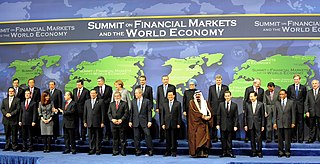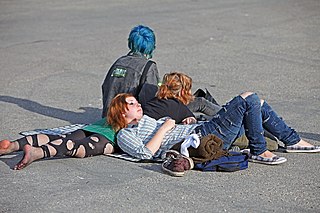
A community is a social unit with a shared socially-significant characteristic, such as place, set of norms, culture, religion, values, customs, or identity. Communities may share a sense of place situated in a given geographical area or in virtual space through communication platforms. Durable good relations that extend beyond immediate genealogical ties also define a sense of community, important to people's identity, practice, and roles in social institutions such as family, home, work, government, TV network, society, or humanity at large. Although communities are usually small relative to personal social ties, "community" may also refer to large-group affiliations such as national communities, international communities, and virtual communities.
Realpolitik is the approach of conducting diplomatic or political policies based primarily on considerations of given circumstances and factors, rather than strictly following ideological, moral, or ethical premises. In this respect, it shares aspects of its philosophical approach with those of realism and pragmatism. It is often simply referred to as pragmatism in politics, e.g. "pursuing pragmatic policies" or "realistic policies".

International Relations is an academic discipline. In a broader sense, the study of IR, in addition to multilateral relations, concerns all activities among states—such as war, diplomacy, trade, and foreign policy—as well as relations with and among other international actors, such as intergovernmental organizations (IGOs), international nongovernmental organizations (INGOs), international legal bodies, and multinational corporations (MNCs).
In politics, hard power is the use of military and economic means to influence the behavior or interests of other political bodies. This form of political power is often aggressive (coercion), and is most immediately effective when imposed by one political body upon another of less military and/or economic power. Hard power contrasts with soft power, which comes from diplomacy, culture and history.
In politics, soft power is the ability to co-opt rather than coerce. It involves shaping the preferences of others through appeal and attraction. Soft power is non-coercive, using culture, political values, and foreign policies to enact change. In 2012, Joseph Nye of Harvard University explained that with soft power, "the best propaganda is not propaganda", further explaining that during the Information Age, "credibility is the scarcest resource".

Crypto-anarchy, crypto-anarchism, cyberanarchy or cyberanarchism is a political ideology focusing on the protection of privacy, political freedom, and economic freedom, the adherents of which use cryptographic software for confidentiality and security while sending and receiving information over computer networks. In his 1988 "Crypto Anarchist Manifesto", Timothy C. May introduced the basic principles of crypto-anarchism, encrypted exchanges ensuring total anonymity, total freedom of speech, and total freedom to trade. In 1992, he read the text at the founding meeting of the cypherpunk movement. Most Crypto-anarchists are anarcho-capitalists but some are anarcho-mutualists.
In international relations, power is defined in several different ways. Material definitions of state power emphasize economic and military power. Other definitions of power emphasize the ability to structure and constitute the nature of social relations between actors. Power is an attribute of particular actors in their interactions, as well as a social process that constitutes the social identities and capacities of actors.

Foreign policy, also known as external policy, is the set of strategies and actions a state employs in its interactions with other states, unions, and international entities. It encompasses a wide range of objectives, including defense and security, economic benefits, and humanitarian assistance. The formulation of foreign policy is influenced by various factors such as domestic considerations, the behavior of other states, and geopolitical strategies. Historically, the practice of foreign policy has evolved from managing short-term crises to addressing long-term international relations, with diplomatic corps playing a crucial role in its development.

A middle power is a state that is not a superpower or a great power, but still exerts influence and plays a significant role in international relations. These countries often possess certain capabilities, such as strong economies, advanced technologies, and diplomatic influence, that allow them to have a voice in global affairs. Middle powers are typically seen as bridge-builders between larger powers, using their diplomatic skills to mediate conflicts and promote cooperation on international issues.

Cultural identity is a part of a person's identity, or their self-conception and self-perception, and is related to nationality, ethnicity, religion, social class, generation, locality, gender, or any kind of social group that has its own distinct culture. In this way, cultural identity is both characteristic of the individual but also of the culturally identical group of members sharing the same cultural identity or upbringing. Cultural identity is an unfixed process that is continually evolving within the discourses of social, cultural, and historical experiences. Some people undergo more cultural identity changes as opposed to others, those who change less often have a clear cultural identity. This means that they have a dynamic yet stable integration of their culture.

Cultural diplomacy is a type of soft power that includes the "exchange of ideas, information, art, language and other aspects of culture among nations and their peoples in order to foster mutual understanding". The purpose of cultural diplomacy is for the people of a foreign nation to develop an understanding of the nation's ideals and institutions in an effort to build broad support for economic and political objectives. In essence "cultural diplomacy reveals the soul of a nation", which in turn creates influence. Public diplomacy has played an important role in advancing national security objectives.
Nation branding aims to measure, build and manage the reputation of countries. In the book Diplomacy in a Globalizing World: Theories and Practices, the authors define nation branding as "the application of corporate marketing concepts and techniques to countries, in the interests of enhancing their reputation in international relations." Many nations try to make brands in order to build relationships between different actors that are not restricted to nations. It extends to public and private sectors in a nation and helps with nationalism. States also want to participate in multilateral projects. Some approaches applied, such as an increasing importance on the symbolic value of products, have led countries to emphasize their distinctive characteristics. The branding and image of a nation-state "and the successful transference of this image to its exports - is just as important as what they actually produce and sell." This is also referred to as country-of-origin effect.
In political science, Noopolitik, formed by a combination of the Greek words νόος nóos ("knowledge") and πολιτικός politikós, is the network-based geopolitics of knowledge. The term was invented by defense experts John Arquilla and David Ronfeldt in a 1999 RAND Corporation study and often appears in connection with that of smart power.
Economic diplomacy is a form of diplomacy that uses the full spectrum of economic tools of a state to achieve its national interests. The scope of economic diplomacy can encompass all of the international economic activities of a state, including, but not limited to, policy decisions designed to influence exports, imports, investments, lending, aid, free trade agreements, among others.
In international relations, the term smart power refers to the combination of hard power and soft power strategies. It is defined by the Center for Strategic and International Studies as "an approach that underscores the necessity of a strong military, but also invests heavily in alliances, partnerships, and institutions of all levels to expand one's influence and establish legitimacy of one's action."
Climate governance is the diplomacy, mechanisms and response measures "aimed at steering social systems towards preventing, mitigating or adapting to the risks posed by climate change". A definitive interpretation is complicated by the wide range of political and social science traditions that are engaged in conceiving and analysing climate governance at different levels and across different arenas. In academia, climate governance has become the concern of geographers, anthropologists, economists and business studies scholars.

Diplomacy comprises spoken or written communication by representatives of state, intergovernmental, or non-governmental institutions intended to influence events in the international system.
Cultural relations are reciprocal, non-coercive transnational interactions between two or more cultures, encompassing a range of activities that are conducted both by state and non-state actors within the space of cultural and civil society. The overall outcomes of cultural relations are greater connectivity, better mutual understanding, more and deeper relationships, mutually beneficial transactions and enhanced sustainable dialogue between states, peoples, non-state actors and cultures.
Data diplomacy can be defined in two different ways: use of data as a means and tool to conduct national diplomacy, or the use of diplomatic actions and skills of various stakeholders to enable and facilitate data access, understanding, and use. Data can help and influence many aspects of the diplomatic process, such as information gathering, negotiations, consular services, humanitarian response and foreign policy development. The second kind of data diplomacy challenges traditional models of diplomacy and can be conducted without tracks and diplomats. Drivers of change in diplomacy are also emerging from industry, academia and directly from the public.
Jonathan Sullivan is a British political scientist and Sinologist who researches political communications in China, Taiwan and other East Asian contexts, China's Internet and cyber-nationalism, studies of the Confucius Institutes, and China's politics of celebrity culture, hip hop and football.







